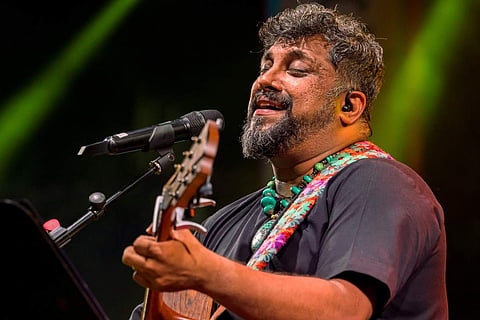
- LIFESTYLE
- FASHION
- FOOD
- ENTERTAINMENT
- EVENTS
- CULTURE
- VIDEOS
- WEB STORIES
- GALLERIES
- GADGETS
- CAR & BIKE
- SOCIETY
- TRAVEL
- NORTH EAST
- INDULGE CONNECT

You know him as the man who sang The Train Song for Gully Boy. You also know him as someone who got the Bangalore pubs grooving with renditions of Mysore Se Aayi. However, to the author he is someone who just does not sing, he performs, and if you have ever attended a Raghu Dixit concert, you would know the difference yourself.
In an exclusive interview with Indulge, Raghu joked that he has managed to stay relevant as a performer with the same setlist for the last decade. His last album was released in 2013 titled Jag Changa. He, however, revealed that he plans on releasing his new album sometime this year.
With his eponymous band, The Raghu Dixit Project, Raghu recently performed at The Bandra Amphitheatre as part of The Mahindra Roots Festival in Mumbai. At the three-day-long cultural and music fest, he sang some tracks from his third and upcoming album, which, he revealed was inspired by a tough phase in his life.
Talking about the same, Raghu said, “It was written in one of my darkest phases. There was a time when I didn't want to live but I survived, thanks to the kindness of lots of people and that got me thinking that if I have survived this, there must be a bigger purpose to my music than just going on stage and having a rocking time.”
“The purpose has definitely changed and now it is to see how I can bring about a positive change in people's lives through my music. The idea is to write songs about hope and faith. I went through a massive transformation in my head and heart, and I want everyone to feel the same confidence that I got through this phase. It put my heart into its rightful place,” he added.
Apart from the album, Raghu also let us in on his plans to connect with the zeitgeist audience, his unexpected shift towards film production, and his take on the ongoing backlash against song re-making.
Read excerpts from the interview:
You recently forayed into production with Orchestra Mysuru. What made you dabble in this completely different side of films as a music composer?
It was accidental. The movie’s subject was so alluring because it was about this culture that started in Mysore in the late 1950s, of performing on the streets during the Ganpati and Dussehra festivals. I grew up listening to music for the first time through these orchestras because my home did not have a tape recorder. I really wanted to be part of the movie when I heard the story. But unfortunately, the team did not have the money to afford my fees. The dilemma was whether I should give up the project or should I jump in. And I decided to jump in and do the music for free. Then the producer said that he would like to offer me a partnership in this movie and give a proportionate share of the profits.
At present, Gen-Z has an attention span dictated by the Instagram algorithm. How do you connect with this particular audience that obsesses over the chorus more than the full song?
When I started off, there was no internet and the only way I could reach out to audiences was by radio or television, which never played independent music. Independent music has always had a tough time reaching out to people. It has taken many years of bombarding the same songs, again and again, to register the fact that there is a guy called Raghu Dixit.
Our songs don’t address fly-by-night topics. People still relate to it on an everyday basis. We have really put a lot of hard work into how we present ourselves on stage and in our performances. Our live shows are the reason why we have stayed relevant, despite performing the same songs for 10 years. Thankfully now, we have finished recording our next album and we should be coming out with it in a couple of months. That being said, I am yet to kind of win over Gen Z. I think it will be quite a challenge but at the same time very interesting to see how they receive my music.
While this Instagram music is one threat to the industry, another thing that has received backlash is the remaking of old iconic, cult songs. What is your take on this?
There is enough space for everything, right? Somebody is doing that kind of music because there is an audience for it. Back then, there was a lack of technology and the quality of the recording was kind of vintage, therefore, most of the young generation did not end up listening to some good old songs. If a remix makes people listen to old music, maybe even go back to its original form and listen to the original, then I think we should appreciate it.
Tell us a little about your upcoming album.
I'm super confident about the next album. It’s called Shakkar and it’s magical. It's definitely my best music, both in terms of musicality and I have got some really amazing names collaborating with each of the songs. This album will be available in four languages. All eight songs have Hindi, Kannada, Tamil, and Telugu versions, and a couple of them are in Bengali and Marathi. The idea is to reach out to larger audiences.
Mail: muskankhullar@newindianexpress.com
Twitter: @muskankhullar03